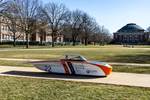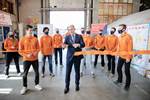Innoptus Solar Team select JetCam for 2023 World Solar Challenge vehicle fabrication
JetCam software streamlines nesting performance for composite ply assembly and cutting for the team’s 100th solar vehicle.
Photo Credit: JetCam
The Belgian-based Innoptus Solar Team, current World Champion of the World Solar Challenge — an international event for solar-powered cars — has selected JetCam International (Monaco) as its nesting software partner to build composite plies for its 2023 solar-powered vehicle, and the team’s 100th car.
The team will use JetCam Expert CAD/CAM with high-performance nesting along with JetCam Orders Controller (JOC) to generate highly optimized nests quickly and automatically for composite cutting. This process is said to be greatly reduced and deskilled through automation and stored knowledge engineering technology. Importing DXF geometries of plies has been made quick and simple, with JOC able to send plies for nesting and create assemblies for future use.
JetCam says the Innoptus Solar Team can expect a swift nesting performance, with a full process taking just under two minutes. This benefit will significantly streamline the creation of its vehicle plies, in addition to using materials efficiently.
“Where time is of the essence, and due to the low volumes and high variety of plies being produced, the ability for the Innoptus team to go from CAD file to a highly optimized nest within a matter of minutes is critical,” Martin Bailey, general manager of JetCam, says. “We are excited to support the team and look forward to watching their success throughout 2023 and beyond.”
Related Content
-
Carbon fiber composite pallet revolutionizes freight industry
LOG Point Pallet fuses advanced materials with innovative design and manufacturing to improve supply chains worldwide.
-
Plant tour: Aernnova Composites, Toledo and Illescas, Spain
RTM and ATL/AFP high-rate production sites feature this composites and engineering leader’s continued push for excellence and innovation for future airframes.
-
Carbon fiber, bionic design achieve peak performance in race-ready production vehicle
Porsche worked with Action Composites to design and manufacture an innovative carbon fiber safety cage option to lightweight one of its series race vehicles, built in a one-shot compression molding process.



